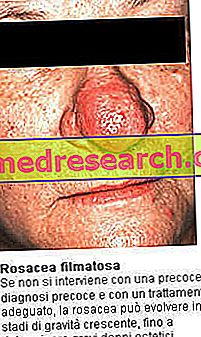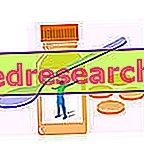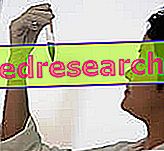What is Rosacea?
Acne rosacea is a chronic inflammatory disease that affects the skin, characterized in all its phases by redness of the central area of the face and pathological dilation of the capillaries.

Various stages of disease severity can be identified: the mildest is manifested by the tendency to blush easily; in the second the? ™ acne rosacea manifests itself with persistent redness of the cheeks and teleangestasia (pathological dilation of the capillaries); in the third there are small reliefs in the skin (papules or pimples) and pustules (with pus); in the fourth, the most advanced stage, the lesions are persistent and more evident. In general, the elements that trigger the disorder are represented by all the stimuli that induce vasodilation: intense emotions, spicy or hot food intake, temperature changes and sun exposure. The symptoms of acne rosacea can be treated in different ways in order to resolve and control the disorders related to it.
Diagnosis
There is no specific test to diagnose acne rosacea. Doctors rely on the description of symptoms and physical examination of the skin. The identification of typical signs makes it possible to distinguish acne rosacea from other dermatological diseases that have similar manifestations and which can be confused with the same, such as acne vulgaris, seborrhea, eczema, lupus and psoriasis.
Treatment
There is no real therapy dedicated to the treatment of acne rosacea, but the treatment can alleviate the symptoms and control their progression. The dermatologist (specialist for skin diseases) can recommend the most appropriate medical treatment regime, as well as recommending some moisturizers, mild cleansers, sun creams and other products to improve skin health.
There are several alternatives to treat rosacea: a combination of topically applied drugs (lotion, cream or gel) and taken by mouth (pills, capsules or tablets) may be necessary. The duration of treatment depends on the type and severity of the symptoms. Often, long-term therapy is needed to prevent the symptoms from occurring again.
To learn more: Medicines for the treatment of Acne Rosacea
For the skin
- Topical therapy. The acne rosacea drugs to be applied locally, carry out an antibacterial and anti-inflammatory activity: they include antibiotics, such as metronidazole and? Azelaic acid, and can be included in therapeutic maintenance programs, for control of symptoms.These topical applications can also cause side effects such as skin irritation, redness, dry skin or burning skin.
For cases of ocular rosacea
When most problems occur at eye level, rosacea can be treated with antibiotics or steroid eye drops (anti-inflammatory activity).- Systemic therapy. Doctors can prescribe oral antibiotics, also for their anti-inflammatory properties (eg: tetracycline, erythromycin etc.). Some side effects related to oral antibiotics include stomach upset, diarrhea, nausea or vomiting. An alternative therapy, sometimes provided for the most severe cases of acne rosacea inflammation, involves isotretinoin intake: this treatment is aimed at to individuals who are not sensitive to other therapeutic remedies (it is usually prescribed for the treatment of cystic acne).
- Surgical treatment. Some surgical treatments help reduce the extent of redness or correct some of the effects of the disease. For example, certain changes due to rhinophyma (which affects the nose, deforming it) can become permanent: in these cases, surgical methods such as electrosurgery and laser surgery can improve the appearance of the skin, reduce the visibility of the vessels blood vessels and remove tissue buildup around the nose. Pulsed light therapy (IPL) can also contribute to the gradual decrease in redness, improved skin and reduced pores.
- Cosmetic treatment. The pathology can have important psychological implications, due to the aesthetic aspects involved. The cosmetics to be used must be: specific for the disease, soothing, well tolerated, free of fragrances. In addition, they must protect from sunlight and create a barrier to defend temperature changes. They can contain substances that protect the capillaries such as bioflavonoids, vitamin C, anthocyanosides or substances with an anti-inflammatory and decongestant action (example: saponins contained in ivy, ruscus and horse-chestnut).
Acne rosacea and make-up:
The protective maquillage and the camouflage allow to resort to specially formulated products, such as colored creams, foundations, and powders of green or yellow, to counteract the redness of the skin or mask the imperfections of the disease.
Some brief considerations regarding the treatment of acne rosacea
- the drugs used to treat acne vulgaris can be too aggressive and cause acne rosacea;
- treatments to reduce the oiliness of oily skin, adopted for the control of sebaceous secretions during acne rosacea, can lead to excessive desquamation associated with seborrheic dermatitis.
Prevention
It is not possible to prevent the onset of rosacea, but measures can be taken to reduce or control the clinical manifestations of the same.
Here are some tips to follow:
- Follow the treatment plan to keep symptoms under control, even once the signs of acne rosacea have improved or disappeared.
- Use mild and oil-free cleansers for facial cleansing. Avoid using products that contain skin irritants, such as alcohol, menthol and fragrances. Patients with acne rosacea should wash with warm water (neither too hot nor too cold), avoiding rubbing of the skin and using special soap-free cleansers.
- Identify the triggers of rosacea and take preventive measures to avoid them: extreme temperatures, sun exposure, spicy foods, alcohol and stress can trigger acne? Rosacea.
- In case of eye problems, follow the therapy recommended by the doctor, carefully clean the eyelids with specific products and possibly apply a warm compress a few times a day.
Acne rosacea and nutrition
There is no specific diet to be adopted in case of acne rosacea, but it is important to control the factors that can cause vasodilation, sudden redness or hot flushes. The main foods to avoid are: alcohol, too hot food, spicy or spicy food and coffee.
Lifestyle
In the case of acne rosacea it is essential to minimize the factors that influence the exacerbation of redness:
- use a broad-spectrum sunscreen with SPF sun protection factor (at least 30 or more) to protect the face from UVA and UVB rays;
- during the winter months, protect your face with a scarf;
- avoid rubbing or touching the skin of the face too much, to avoid irritating it;
- avoid products for the face that contain alcohol or skin irritants: use non-aggressive detergents and delicate moisturizers;
- use products labeled as non-comedogenic (or oil-free), which do not clog pores;
- avoid very hot environments;
- avoid the consumption of alcoholic beverages;
- avoid emotional stress.
Final considerations
Rosacea is a recurrent disease: symptoms can vary in terms of severity, but can still be controlled with the use of appropriate therapies. Early identification of a strategy to combat the signs associated with its course, which includes improving personal habits, can help to limit acne rosacea disorders.



